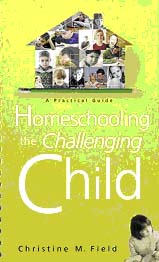One thing that makes this book stand out above many others on working with "challenging" children is that the author Christine Field has experienced homeschooling on both ends of the spectrum. She began with compliant children who were relatively easy to teach then her next two presented difficult challenges that forced her to reconsider her attitudes about a number of issues.
It's easy to confidently tell other people what they should do when you're speaking from a secure position where everything is going smoothly. But when you're the one dealing with difficult situations, you learn to be less directive, less judgmental, less critical of choices others make in dealing with their own difficulties. Consequently, Christine's broadened understanding of the world of challenging children and what that means for their parents comes through loud and clear.
Christine begins by helping parents sort out what's going on, differentiating between discipline issues, learning styles, learning disabilities, and attention disorders. I actually learned that ADHD is not a learning disability! (See chapter three.) As you can see, learning disabilities is not the only challenge Christine discusses, although it is the dominant topic. Once you know what you're dealing with, she gives you suggestions for working through personality clashes, adjusting your teaching style to fit your child's learning style, disciplining children (this chapter is great for ALL parents), and dealing with and improving family relationships and your own mental health as a homeschooling parent. All this is written from a Christian perspective.
Interestingly, chapters on "Planning a Program for the Challenging Learner" and "Getting Help: Finding Professionals and Resources" are last. Actually, I think this is a great approach. Getting a professional diagnosis and an IEP are useless if you don't recognize other dynamics within your family. There's lots of practical help in these last two chapters, including resources and contact information.
This book is great for parents who have children who are difficult to teach whether or not they actually fit a disability or disorder diagnosis.










